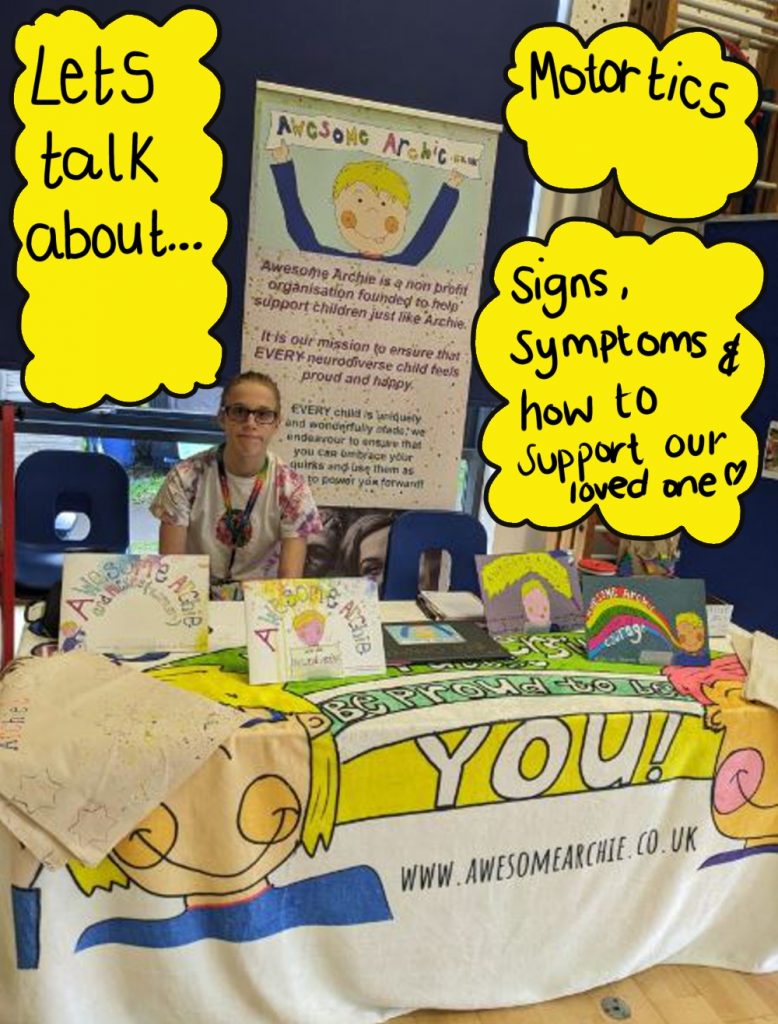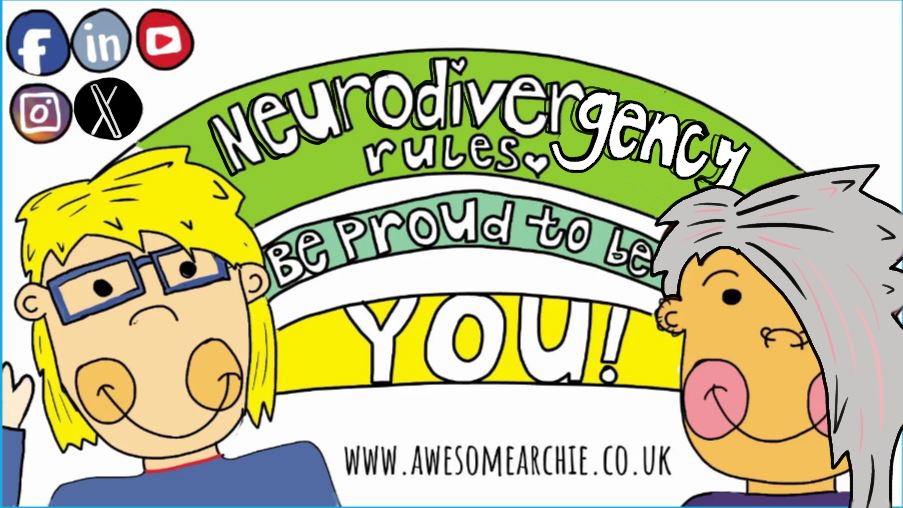
Along side Archie’s many other challenges, he was diagnosed with motor tics last year.
In years gone by, we had put his repetitive movements down to “stimming” (a self-stimulatory behaviour that is marked by a repetitive action or movement of the body such as repeatedly tapping on objects or the ears, snapping the fingers, blinking the eyes, rocking from side to side, or grunting. This is typically associated with certain conditions such as autism spectrum disorder), yet, this was not the case.
Archie still stims (his favourite being able to lay flat on the floor and repeatedly watch the wheels of a toy car move back and forth, or our fishy bubble tube) but his tics have become far more aggressive and regular.

With this in mind we thought we’d share some of the finer details of the signs, symptoms and how we can support people living with tics… no matter the cause 😊
Thanks to the Royal Children’s hospital Melbourne for this brilliant explanation!
Signs and symptoms of Motor tics
Motor tics are movements that can affect any part of the body, but particularly the face, eyes, head and shoulders. Any movement can be a tic and the movement is made without a clear reason or purpose.
Phonic tics, which make a sound, can include anything from throat clearing, sniffing, squeaking to words or even phrases. They can sound exaggerated and out of context.
Tics will come and go and can change over time and one tic can stop as another starts. Tics tend to increase during strong feelings, like stress, nervousness, excitement, or tiredness. They are ‘suggestible’, which means that talking about tics and drawing attention to them will increase their occurrence. This can increase stress and frequency of tics for the young person. Some people can suppress their tics for short periods even though they are involuntary. This can be hard to do for a long time and more tics may appear afterwards. In general, tics are reduced at times of active and focused concentration.
What causes tics?
We do not fully understand the underlying cause of tics. There are complex genetic and neurobiological factors, and it is more common if another family member also has tics. It is important to remember tics are not harmful.
How are tics diagnosed?
Tics are diagnosed by a paediatrician or neurologist. No tests are required to diagnose tics. Your paediatrician or neurologist may ask you to describe or imitate the movements that your child makes. They will ask your child about their experience of the tics. Home videos can also be helpful for diagnosis. Some children with tics experience extra problems like difficulty concentrating, fidgeting, impulsivity, and anxiety. Your paediatrician or neurologist will also ask about your child’s development, learning and focus.
Management for tics
One of the challenges with having tics is the response from family, friends or other people around your child. It is a good idea for these individuals to not make a fuss about tics when they notice them (active ignoring). Asking the young person to stop the behaviour, or punishing them for the tics can make tics worse as the young person is not intentionally doing them. It can be helpful to discuss this with school teachers privately, so everyone at home and at school responds to the tics in the same way.
Some helpful general measures include:
- Not drawing attention to the tics when they occur – do not react, actively ignore them.
- Ensuring the young person has adequate sleep and follows a regular sleep routine to prevent fatigue.
- Agreeing on basic strategies for the young person to release the tics in a way that they are comfortable with:
- identifying a quiet and safe place for them to go to when they feel the need to release tics
- taking quick short breaks from a stressful activity
- Switching to a different activity when tics build up
- Guiding the young person to build self-awareness of stress levels and use of mindfulness techniques. This may include deep breathing exercises, colouring in or listening to music.
- Recognising and emphasising the young person’s strengths and building their self-confidence.
Most people with tics do not require any specific treatment. This is particularly the case when tics are not interfering with the young person’s daily life. Where tics are disruptive, psychological treatments and medicines can be considered.
Psychological treatments can be helpful in some well-motivated young persons, even though tics are not behavioural or voluntary. A psychologist can guide the young person to delay or change the tics if the young person can learn to recognise the urge leading to a tic. Effective treatments include habit reversal and comprehensive behavioural therapy for tics (CBIT). Relaxation training can also be helpful. These treatments require motivation and practice and can take some time, which is why they may not be suitable for all young people. Your child’s treating team will discuss if they believe this treatment will be suitable for your child.
Medications can reduce severity and frequency of tics but cannot stop or cure the tics. They are not effective for everyone and there can be side effects.
If your child has problems with difficulty concentrating, fidgeting, impulsivity or anxiety, discuss this with your paediatrician. These behaviours should be assessed and treated. This is an important aspect in managing your child’s overall health and well-being and can be helpful in reducing tics.
When to see a doctor
You should visit your GP or paediatrican if you are worried about your child’s movements or their learning, concentration or development. Your child’s doctor can evaluate your child and provide helpful resources, provide further advice for managing tics, or refer your child to a specialist if required.
Key points to remember
- Tics are movements and sounds that people make involuntarily.
- Tics are not harmful to your child, but some children with tics experience difficulty concentrating, fidgeting, impulsivity or anxiety.
- Home videos can be helpful for diagnosis.
- Active ignoring and not drawing attention to the movements are helpful strategies when tics do not bother your child.
- Speak to your GP if you are worried about your child’s tics.
Check out Awesome Archie’s video of his real life experience living with the condition here… https://www.tiktok.com/@awesomearchie_/video/7341323597790727456
AND REMEBER…

